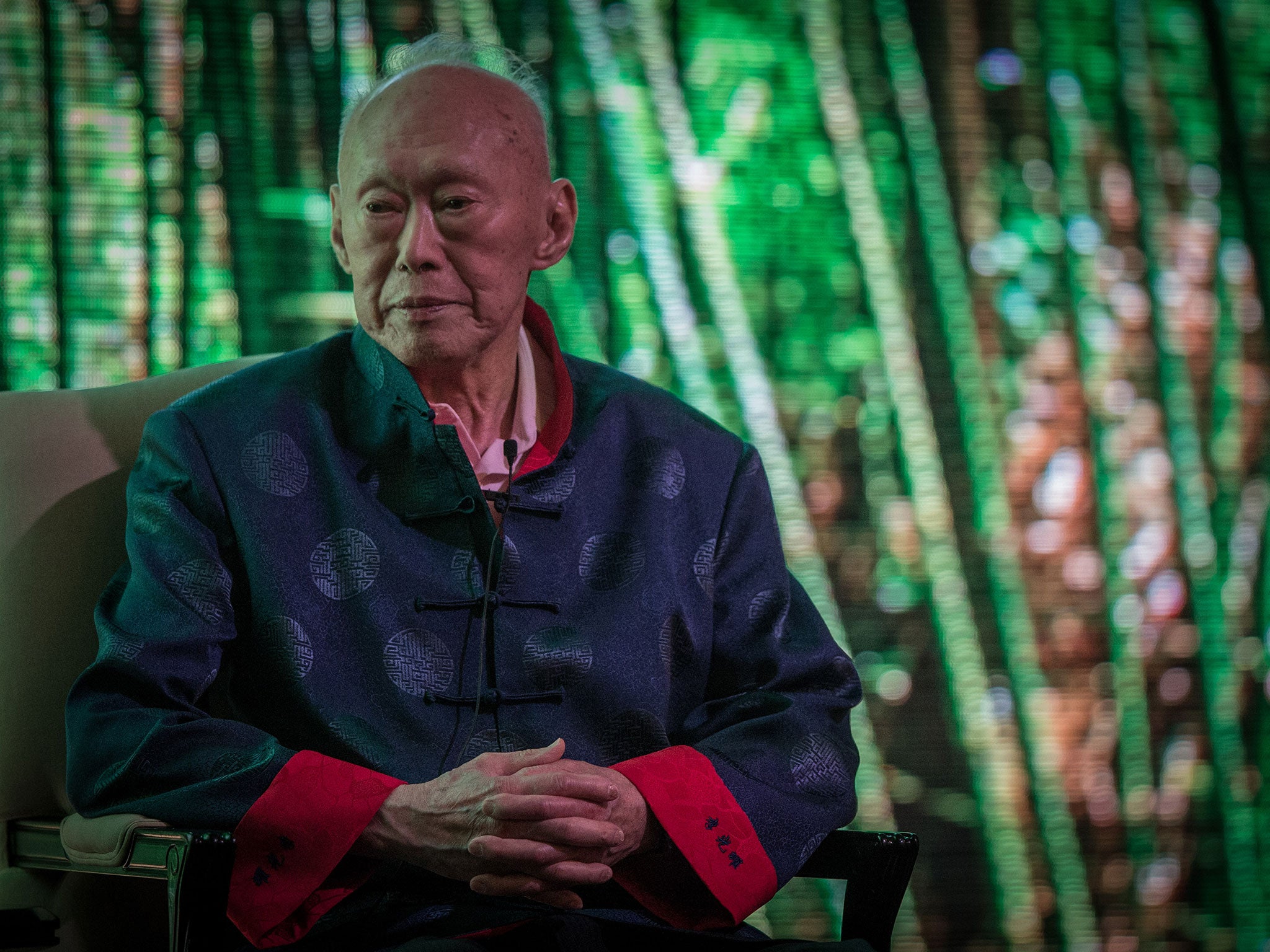Lee Kuan Yew dead: Founder of modern Singapore dies aged 91
Lee was admitted to Singapore General Hospital on Feb. 5 for severe pneumonia and was later put on life support

Lee Kuan Yew – the founding father of Singapore who transformed the city state from a malaria-infested backwater into one of the first Asian Tiger economies – has died at the age of 91.
Supporters viewed him as a towering figure in post-colonial Asia, a leader who turned the former British colony into one of the richest places on the planet almost by sheer force of will alone.
He created an efficient government with little corruption, cracked down heavily on crime, built a first-class education system and attracted foreign companies with low taxes.
However Mr Lee, who succumbed to pneumonia in hospital just after 3.15am on Monday local time, was also viewed as authoritarian who used Draconian tactics to clamp down on free speech and any sign of dissent.
Some of his political rivals were jailed without trial for decades and brought defamation lawsuits against journalists and opposition politicians for daring to stand up to him.
In a biography, Lee Kuan Yew: The Man And His Ideas, he spelled out his philosophy: “I'm very determined. If I decide that something is worth doing, then I'll put my heart and soul to it. The whole ground can be against me, but if I know it is right, I'll do it. That's the business of a leader.”
And many Singaporeans worshipped the man who became Singapore’s first Prime Minister in 1959 and held power for more than 30 years. Even after standing down in 1990, he remained a member of the cabinet until 2011 and was an MP at his death. It was widely recognised that he had significant influence over the current Prime Minister, his eldest son Lee Hsien Loong.
The Prime Minister’s office said in a statement that Mr Lee “passed away peacefully” at Singapore General Hospital, where he had been on life support. It added that arrangements for the public to pay respects and funeral arrangements would be announced later.
Lee Kuan Yew: Life in pictures
Show all 12UN secretary-general Ban Ki-moon paid tribute to Mr Lee’s achievements, saying he had turned “a developing country [into] one of the most developed in the world, transforming it into a thriving international business hub”.
He added that he was “deeply saddened” by his death, saying Singapore’s “founding father will be remembered as one of the most inspiring Asian leaders” on this the 50th anniversary of its independence.
Mr Lee was born a British citizen in Singapore in 1923 and lived through the Japanese occupation of the city during World War II, working as a translator for the Japanese and narrowly avoiding being shot in the Sook Ching massacre.
After the war, he came to the UK as student, achieving a double first in law at Cambridge University and campaigning for a Labour MP in Devon. He also met and secretly married his wife Kwa Geok Choo while in Britain. She died in 2010.
In early life Mr Lee was a Socialist and, after returning to Singapore in 1949, he became a leading lawyer specialising in workers’ rights. He also helped to found the People’s Action Party, which won office in 1959 and never lost it. Mr Lee then led Singapore into a merger with Malaysia in 1963 but re-established it as an independent country in 1965 amid violent clashes between different ethnic groups.
He later described the split as a “moment of anguish” and it was an experience that had a lasting effect on his style of leadership.
“Freedom of the press, freedom of the news media, must be subordinated to the overriding needs of the integrity of Singapore,” he once said.
His mix of capitalism and strong Government which some compared to Communist dictatorships certainly seemed to work as the country’s gross national product per person increased by 15 times between 1960 and 1980. Today its citizens are ranked as the third richest in the world by the International Monetary Fund.
After meeting Mr Lee at the White House in October 2009, Barack Obama described him as “one of the legendary figures of Asia in the 20th and 21st centuries … somebody who helped trigger the Asian economic miracle”.
Mr Lee admitted he had sometimes done “nasty things” like “locking fellows up without trial” in an interview with The New York Times in 2010.
“I'm not saying everything I did was right,” he added. “But everything I did was for an honourable purpose.”
Another former Singapore prime minister, Goh Chok Tong, who succeeded Mr Lee, said: "My tears welled up as I received the sad news. He was my leader, mentor, inspiration, the man I looked up to most.”
One Singaporean, Nurhidayah Osman, wrote on the prime minister's Facebook page: “Thank you for giving us, Singaporeans, a great nation to live in, a country that I can be proud of, a country where I can go out a midnight and not be afraid.”
Responding to news of Mr Lee’s death, Mr Obama said: “He was a true giant of history who will be remembered for generations to come as the father of modern Singapore and as one the great strategists of Asian affairs.”
Subscribe to Independent Premium to bookmark this article
Want to bookmark your favourite articles and stories to read or reference later? Start your Independent Premium subscription today.

Join our commenting forum
Join thought-provoking conversations, follow other Independent readers and see their replies